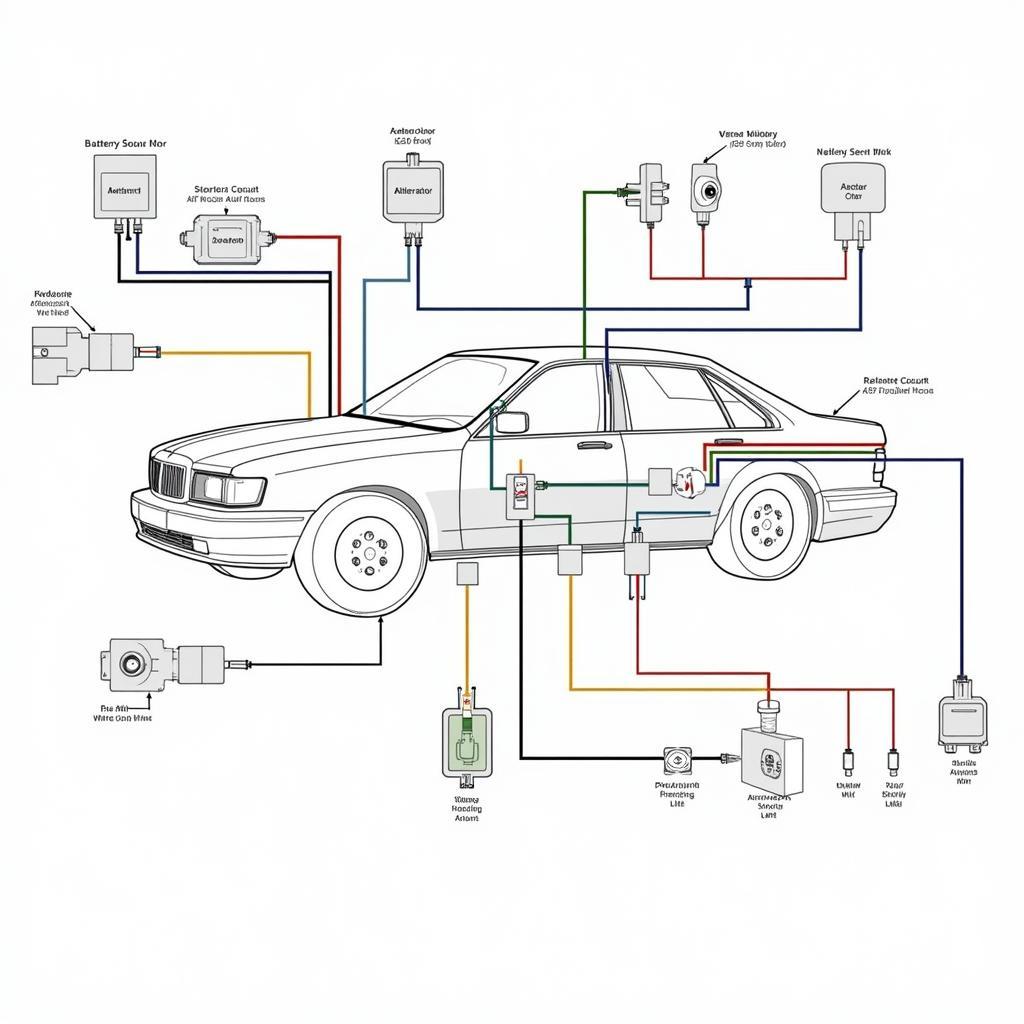Smart cars, with their compact size and fuel-efficient nature, are becoming increasingly popular. While these vehicles offer numerous benefits, understanding their unique design and maintenance requirements is crucial for ensuring optimal performance and longevity. This guide aims to provide valuable insights for both smart car owners and mechanics, covering essential self-maintenance tips and troubleshooting strategies.
Why Smart Cars Need Special Attention
Smart cars, particularly the “ForTwo” model, are designed for practicality and city driving. However, their compact size and innovative engineering present unique challenges for maintenance.
Smaller Components, Greater Sensitivity
The “ForTwo” model features a smaller engine and a compact overall design, which means that components are more tightly packed. This can make accessing and repairing certain parts more difficult, requiring specialized tools and knowledge.
High-Tech Features Demand Expertise
Smart cars are equipped with advanced technology, including electric power steering, stability control, and various electronic systems. These features require specific expertise and specialized tools for diagnosis and repair.
Understanding the Difference: Gas vs Electric Smart Cars
The “ForTwo” comes in both gasoline and electric versions. While some maintenance principles are similar, there are important distinctions to consider:
- Gas-powered Smart Cars: Follow standard automotive maintenance guidelines, with a focus on regular oil changes, filter replacements, and routine inspections.
- Electric Smart Cars: Require specialized maintenance procedures for the electric motor, battery pack, and charging system.
Smart Car Self-Maintenance Tips for Owners
Taking care of your Smart car yourself can save money and empower you to understand your vehicle better. Here’s what you need to know:
1. Familiarize Yourself with the Manual
Your owner’s manual is your most valuable resource. It provides detailed instructions for all maintenance tasks, including recommended intervals for oil changes, fluid checks, and tire rotations.
2. Regular Oil Changes: Key to Engine Longevity
Oil lubricates engine components, reducing friction and wear. Smart cars, while compact, still require regular oil changes. Consult your owner’s manual for recommended intervals.
3. Fluid Checks: Maintaining Vital Systems
Ensure your Smart car’s fluids (coolant, brake fluid, power steering fluid) are at the correct levels. Regularly check for leaks, discoloration, or unusual smells.
4. Tire Pressure: Safety and Fuel Efficiency
Maintaining proper tire pressure is crucial for safety and fuel efficiency. Check your tires regularly using a tire pressure gauge.
5. Battery Care: A Key Concern for Electric Models
For electric Smart cars, battery maintenance is paramount. Follow your owner’s manual for charging guidelines and battery health optimization.
6. Air Filter Replacement: Breathing Easy
A clogged air filter can reduce engine performance. Replace your air filter regularly to ensure optimal airflow and fuel efficiency.
Troubleshooting Common Smart Car Issues
While many issues can be addressed by a qualified mechanic, understanding common Smart car problems can help you diagnose and address minor issues yourself.
1. Electrical Malfunctions: Smart Cars Are Tech-Heavy
Smart cars rely heavily on electronics, making electrical malfunctions a potential concern. Regularly inspect wiring for damage, loose connections, or corrosion.
2. Battery Problems: A Concern for All Models
Both gasoline and electric Smart cars have battery problems. Ensure your battery terminals are clean, and check the battery voltage regularly.
3. Unusual Noises: A Sign of Underlying Problems
Any unusual noise coming from your engine, brakes, or steering system warrants attention. Identify the source of the noise and address it promptly.
4. Engine Light: Don’t Ignore It
The “check engine” light is a signal that something is amiss. Use an OBD-II scanner to read the trouble codes and address the underlying issue.
Expert Insights: Maintaining a Smart Car
“Smart cars require a different approach to maintenance than conventional vehicles,” says David Smith, a seasoned mechanic specializing in compact car repair. “Their smaller parts and advanced technology demand specialized tools and knowledge.”
“Don’t be afraid to invest in a good OBD-II scanner,” adds Lisa Brown, a seasoned Smart car owner. “It can save you money in the long run by helping you identify and resolve minor issues before they escalate.”
Key Takeaways
- Smart cars require specialized maintenance due to their unique design and technology.
- Regular maintenance, including oil changes, fluid checks, and tire pressure monitoring, is crucial.
- Understanding common issues and troubleshooting techniques empowers you to handle minor repairs yourself.
- Investing in quality tools and resources, such as an OBD-II scanner and a comprehensive owner’s manual, can enhance your self-maintenance capabilities.
Need Professional Help?
If you’re unsure about any aspect of Smart car maintenance or need professional assistance with repairs, contact Autotippro at +1 (641) 206-8880. We have a team of experienced technicians who can provide expert advice and services for your Smart car.
AutoTipPro
500 N St Mary’s St, San Antonio, TX 78205, United States
FAQ
Q: What are the most common Smart car problems?
A: Common Smart car problems include electrical issues, battery problems, unusual noises, and engine light alerts.
Q: Can I perform oil changes and other basic maintenance myself?
A: Yes, you can perform basic maintenance like oil changes, fluid checks, and tire pressure checks yourself. Consult your owner’s manual for detailed instructions.
Q: What tools do I need for Smart car maintenance?
A: Essential tools include a tire pressure gauge, a torque wrench, an OBD-II scanner, and a set of basic tools like wrenches and screwdrivers.
Q: How often should I service my Smart car?
A: Follow the recommended service intervals outlined in your owner’s manual. This typically includes annual inspections and oil changes every 5,000-7,500 miles.
Q: How do I know if my Smart car’s battery is faulty?
A: Look for symptoms like a slow start, dimming headlights, and an inability to hold a charge. You can also test the battery voltage using a multimeter.





Leave a Reply